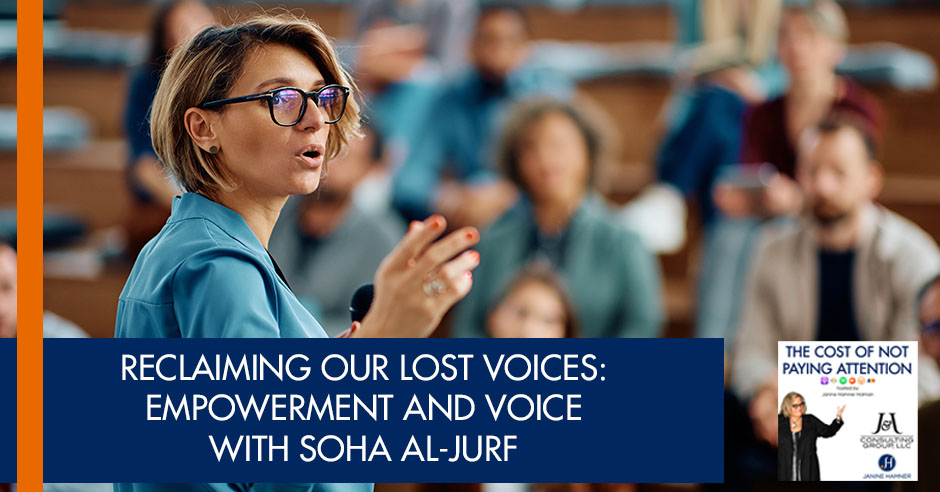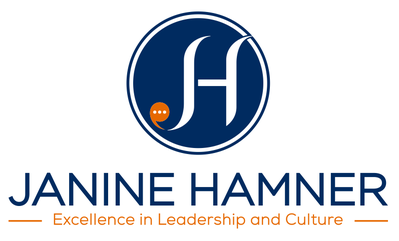
Our voices hold power, yet so often, we ignore their potential. Janine Hamner Holman welcomes Soha Al-jurf, Founder of Voice Coaching for Creatives, who explores how uncovering our lost voices can transform the way we express ourselves and connect with others. From how opera singers deal with voice loss to the diminishing of one’s voice in society, she reveals how social issues, internal narratives, and cultural expectations shape the way we speak or behave. Soha explains how to reconnect with our authentic selves, heal past traumas, and truly hear the stories our voices tell. She also explores the unique connection between voice mechanics and Jungian psychology by sharing all about her innovative “Soundscapes of the Psyche” method.
GUEST: Soha Al-jurf | LinkedIn | Website
HOST: Janine Hamner Holman | [email protected] | LinkedIn, Facebook, and Twitter | Subscribe to my Newsletter! | Book me to Speak!
—
Listen to the podcast here
Reclaiming Our Lost Voices: Empowerment And Voice With Soha Al-jurf
Introduction
Welcome to the show. I am thrilled to introduce you to our guest. Soha Al-jurf is the founder of Voice Coaching for Creatives. She combines her expertise in the voice, like working with opera singers and working with opera singers who have hurt their voices. She combines this deep expertise in understanding the mechanics and other things, we’ll get into that, about the voice with her knowledge of Jungian psychology. Get that, you guys. She’s combining this deep experience and understanding of our voice and what can get in the way of us using our voice with her knowledge of Jungian psychology to help women find their voices and heal their minds through one-on-one coaching and online in-person workshops. Welcome to the show, Soha.
Thank you so much for having me.
You’re welcome. I’m so excited for us to have this conversation.
Me too.
The Problem With Ignoring Our Voices
Tell me, what is something or even the one thing that you have noticed, especially through your work with your clients that we’re not paying enough attention to? What’s the problem that inattention is causing?
I would say from my work that we’re not paying enough attention to our own voices. That can mean a myriad of things. It can mean that we’re not listening to ourselves when we talk, which can be one problem for several reasons, but also the inner voices and our authentic voice versus the voices of society. As you mentioned, I’ve spent many years working with opera singers. When opera singers are injured, there’s often a question of what was out of alignment in their body, mind, spirit, and soul that was throwing the voice out of whack.
For opera singers in particular who end up working with me, it’s often that they’re in the business or throughout their training, they somehow were told there was something wrong with them or they needed to compete and they’re not competitive. They want to be collaborative. They end up feeling like they have to push their voices to fit a mold that they think other people want them to fit. Sometimes it’s true, but if that’s out of alignment with what their own mind, body, soul, and voice wants to actually produce, then they’re going to get injured.
Society often forces people, especially women, to suppress their true voices to fit molds that do not align with their authentic selves. Share on XA lot of my work has to do with, can we back up and listen to the core authentic voice that’s actually in alignment with your heart, soul, and the body that you came in with, which is your actual instrument. How do we backtrack to that and figure out how to listen to the internal impulse that’s driving you to sing in each moment, not just in theory, but moment by moment, that inner impulse to make sound, to create voice?
There’s so much here that I want to explore with you. Before we get to that, one of the things that just occurred to me as you were talking, I could be totally wrong, I am curious how much of the singing for women is that we’re supposed to be high, we’re supposed to be feminine, we’re supposed to be able to reach those heights as someone with a deeper toned voice. I’ve always thought that my voice was wrong. I’m curious about that. For men, how much of it goes the other way that they think their voice should be very deep and rich and maybe that’s not really where their voice wants to be. I’m curious, is that part of what happens often or are there other dynamics in play?
In the speaking and theater and let’s say newscaster broadcaster world, there’s a name for that. They call it the Bogart-Bacall syndrome. I don’t know what your age group demographics are for your readers if who Bogart and Bacall are but Bogart and Bacall were both actor-actresses who were just, I think they were both heavy smokers and had these very low deep voices.
At the time, it was considered to be sultry. That was an aesthetic of beauty and the voices were deep. Especially Bacall’s, her voice was much deeper than the average woman. All of those things you’re describing come into play. Within the opera world, yes, it’s for women, for sopranos and tenors, it’s always get higher, get higher. For bases and baritones, it’s always get lower, get lower. A lot of our ideas about masculinity and femininity come into that, but also, believe it or not, a lot of that goes back to the church.
A lot of the aesthetic of what is aesthetically pleasing has to do with going higher and higher and higher up toward heaven. Being angelic and all of that. Some of that influences it as well. That’s a whole can of worms, which is fascinating. There’s an entire body of academia that’s based on this idea of what happened to the singing voice because of Christianity and the idea of what music should or shouldn’t be. What women’s voices should or shouldn’t be? Should they be heard, or should they not? There’s a lot to unpack there.
Helping Women Find Their Authentic Voice
Speaking of unpacking, you work in particular with women to help us find our authentic voice. Whether that is helping me as someone who does a lot of keynote speaking find the most power and the most richness in my voice and the most tonality and differentiation. Whether that’s working with a singer. Whether that’s working with someone who is more quiet and introverted and less likely to speak up or someone who, for various reasons, their voice has been damped down and pushed aside or not taken seriously. I think women in particular can lose our voice because of society and family and education and religion and all kinds of other things. We can lose our true self and our ability to speak our truth.
100%. A lot of people have asked me why I focus on women. There are a lot of reasons for that. I also want to make it clear. I am delighted to work with men but when I was creating my marketing and going through my spirituality and my marketing process of figuring out how I am and what I’m here to do, there was this back-and-forth question of, is it exclusively women? I’ll explain a couple of reasons why I focus on women. Although I’m delighted to work with men who get through that barrier.
Men who see my marketing and are like, “I want to work with you.” I’m like, “Yes, you are my client. Please come, I’m delighted to work with you.” Part of the reason that my work is focused on women, so I worked as a speech pathologist for about 20 years before I transitioned into creating this work that I’m creating now. Physiologically, the female voice is more prone to injury. The vocal folds vibrate an octave higher than men’s voices, so they’re vibrating twice as fast per second. They’re just more hits per second on the vocal cords.
Just the way the body is structured and positioned, women’s voices are just more prone to injury. Especially in the opera singer world, I was always working more with women than with men because their voices are more prone to injury. Now, tenor voices, the higher male voices will also be injured. Baces and baritones do injure. It’s not that they don’t. It’s just statistically women are more likely to be injured. When women were working with me, particularly in the opera world, but in my clinical practice in general, there were just so many issues that seemed to be unique to women and their voices.
For example, an attorney was told that her voice was too high and she couldn’t be taken seriously. She was forcing her voice into that Bacall syndrome and then her voice would wear out and fatigue and it would hurt because it’s not what she’s meant to do. Radio broadcasters had that same problem back when we had radio. I don’t even know if it exists anymore. That radio television, same thing, that they’re pushing the voice down. Part of that had to do with air frequencies. How radio frequencies were transmitted and what frequencies would transmit well over radio frequencies.
Some of those lower frequencies or a telephone did transmit better when they were a little lower. Some of that is just like we live in a patriarchy and we have certain expectations about patriarchal structures. The opera world is no exception to that patriarchy. Again, I’m making blanket statements, but a lot of the women I was working with were feeling commodified. They were feeling consumed. They were feeling exceptionally sexualized. Oftentimes, unfortunately, in the opera world, women were being mistreated.

Lost Voices: A lot of women feel commodified, consumed, and exceptionally sexualized in the opera world.
It happens. We hear it more in Hollywood. We don’t think of it as much in opera but a lot of women were coming and working with me and they had a lot of trauma. Some of it was overt sexual trauma in the opera world of either being groped, harassed, mistreated, assaulted, backstage, that thing or being told flat out, “You’ll get this role if you sleep with me, you won’t get this role if you don’t. I’m going to pull you from this role if you don’t.” I was seeing the more I worked, especially young opera singers. The more I was seeing there was a lot of coercion toward women. Now, the court cases that have come to light have been, especially if you look at, let’s say, San Francisco Opera, there was a case that came out with a gay man who took it to court and won.
I’m sure men, especially gay men, are probably experiencing similar things. The men who come work with me, again, the men who get past that feminine gait tend to be sensitive men who were sensitive boys. These are men who don’t want to be in that aggressive, commodifying world. They just happen to have a beautiful voice and want to use their art form but we end up stuck in this patriarchal construct that’s harming women and men who don’t fit into that, who don’t identify as classically patriarchal.
I know that one of your superpowers is that you help people who may also be engaging in typical talk therapy or other kinds of therapeutic modalities where there’s something that’s still stuck or something that’s still sticky in there that they haven’t yet been able to really get to the bottom of. With your practice of combining Jungian psychology with this deep understanding of the voice, you are able to help people get some stuff unstuck.
As I mentioned, I’d been working clinically with The Voice for about twenty years. My last job was in San Francisco, so I also had a connection as a consultant to San Francisco Opera. I was doing all this voice stuff and I was really ambivalent. I loved and hated my job. I loved my patients. I loved the work I was doing. It was so fascinating and completely fulfilling. I was miserable and exhausted. I was truly ambivalent, very deeply ambivalent, and I couldn’t quite figure out why. As I mentioned, a lot of the work that I ended up doing was inherently psychological and spiritual because what is the, yes, you may come with an injured voice, but then we have all of this.
If I’m just looking at the physical voice, treating the voice like a physical therapist for the voice, and I’m just looking at the voice, I’m missing this idea that this woman is standing on stage feeling like she’s being consumed by an audience. As a history perhaps of trauma that’s being triggered every time she gets on stage. She’s stuck in this. It wasn’t just with opera singers. Every human carries trauma.
There I was sitting in an office with patient after patient after patient. I knew that I couldn’t just be a physical therapist for the voice. That just didn’t work for me. I didn’t have the tools to go any deeper because I also wasn’t a licensed therapist. Eventually, I left my career and started investigating. I really tried to get away from voice for a really long time. I just kept trying to leave it behind. It was one of those things where fate and destiny were like, “That’s not what we’re doing.”
We’re just going to keep reeling you back in.
Exactly. I started just through a long process of soul searching and travel and a lot of reading. Yes, I got a degree in Jungian studies. I intentionally didn’t get a clinical degree in Jungian studies because I wanted to see what I might create on my own. I wanted to be Jung or be Freud in that sense of, “What do they have that I don’t have? They just sat with a bunch of people and observed a bunch of things and then came up with a system. I can do that.” That’s what I’ve been doing for the last decade.
The system that I’ve developed, I call it Soundscapes of the Psyche, and it’s very much developed on this premise of, you mentioned a superpower, but the superpower, if I have one, is to be able to draw out the core essence of a voice, the core essence of a person, the core essence of this is what your voice is telling me about your whole world. It’s very holistic. I mean, I’ve listened to thousands and thousands of voices and there’s always a story behind that. That’s the same thing a therapist is doing, a talk therapist, but the method is slightly different.

Lost Voices: It is nice to have a superpower to draw out the core essence of a voice and discover what it is telling you about your whole world.
I started thinking, “What if I use the voice to get out the psychology because I’m already listening to the voice for the core essence and the soul of a human and to get a gestalt sense of what’s going on in your life, what needs to change? What if I codified that into a system?” What I started doing is I started recording intakes with clients and some of my opera students when they were just talking about their frustrations, their struggles. They all knew that I was trying to find a way to combine voice, psychology, spirituality, and the feminine.
They allowed me to make them my guinea pigs. I was like, “What would happen if I just record you talking about whatever’s on your mind?” One opera student came to me and she was going through a breakup and typical stuff we’ve all been through of heartbroken. “He was lying to me, he was cheating on me. How am I here again?” She’s stalking him. Can we knock that off? I recorded that whole conversation and then listening to it again, like I would listen to her opera voice that was injured and try to figure out from what I was hearing.
Where’s the core that is working, the core that’s not working? When I’m listening to an opera singer’s voice, there’s a healthy voice in there underneath the injured voice. There’s an authentic, there’s an aligned voice in there that if I can help them get realigned, the voice will heal simply by using the more authentically aligned voice. I thought, “If that’s true for the voice, can’t I use the voice and travel backward through the voice into the psyche to figure out what in the unconscious, A, produced that outcome? B, how do I unwind and unravel it so we get at the source in a way that’s different from just telling and retelling the stories again?”
This young woman had been in therapy for twenty years. Every time she went through a breakup, she was telling the exact same story over and over again to her therapist. We have these scripts and we have these habits and we have these ways that we’re used to using our voices, both metaphorically and literally. What I did is I took that voice sample of hers and I put it into digital software. I put it into GarageBand. I started cutting it up and mixing it and rearranging it so that she could hear what I just described to you.
That she could hear that underneath all of this. Underneath the fact that you’re stalking your ex-boyfriend who cheated on you and you’re repeating the story over and over again. Underneath this, there’s a super-empowered woman that I know because I’ve worked with her for ten years and I’ve watched her go from having a vocal injury to taking over the world with her voice. I know that this woman’s in there, why isn’t that transferring to the psyche? What is it about talk therapy that’s not getting at that?
I played around, I mixed the sample of her intake of just her talking intake. When you do it in digital software, you can do anything. You can cut pieces up, you can layer them, you can amplify them. I could put bits of her singing interspersed within her speaking. I could layer her singing and her speaking. I could put music in. I could put sounds of leaves crunching or waves crashing. I could create this whole soundscape that to me was a mirror of her psyche that she could then go listen to this mirroring of her own psyche as a soundscape and she could start to hear what I was hearing.
Hearing The Soundscape Of Our Psyche
What happens when people have that opportunity to hear the soundscape of their psyche? What a fascinating sentence that is. What is possible when we hear the soundscape of our psyche?
It’s been incredible. I mean, it’s a methodology that I created. For the last year, I’ve been piloting it and trying it on friends and friends of friends and friends of friends. I just launched officially with strangers a few months ago. What’s amazing is that they just hear themselves in a way they never have. Even for an opera singer who, I mean, she recorded every lesson and coaching she’s ever had. It’s not like she hasn’t heard her voice before.
Even if she recorded her therapy session and listened back, she’d still be replaying the same scripts. What happens is that the scripts get disrupted, which is what we’re hoping to do in talk therapy. However, it just takes a very long time because we’re speaking linearly, and your therapist cannot do anything except reflect back. Within a one-hour session, they can only reflect back a sentence or two.

Lost Voices: Your therapist cannot do anything except reflect back a sentence or two within a one-hour session.
I have this whole hour that I’m giving them back and I’m like, “Here’s an hour of all the things I would reflect to you over 30 or 50 sessions, but I’m going to do it all in one.” For clients who’ve already worked on their stuff, and I would not do this process with somebody who’s in acute trauma. I would not do this. There are absolutely things for which circumstances for which talk therapy is a hundred percent the way to go or talk therapy should be on backup because this is going to go deep and it’s going to go fast.
Buckle your seatbelt.
That’s the way I’ve always worked with voice anyway. Once I left San Francisco, I would go, and they’d hire me to come in for two days. I’d see everyone fast. I’d give them enough to work on for six months to a year. It’s just my model. It’s just like, “Here’s a bunch of stuff, let’s do it all.” If you’re fragile in any way, it’s not the best approach. You need to have a certain amount of grounding and stability. 100%, all my clients, I want to make sure they’ve had therapy first already, and that they’ve worked through most of their stuff, but either tuck therapy just isn’t working anymore.
They’re still stuck. They find themselves repeating the same scripts. For those people so far, as I said, I’ve been doing it for almost two years now, piloting it and taking on complete strangers now. You’re my best friend and my best friend. It’s been really incredible. I mean, people have said they don’t need therapy anymore after they’ve done this. They have said they’re hearing their voice for the first time in their lives. They’ve said they have fallen in love with themselves for the first time in their lives. People have quit jobs.
They’ve transitioned into out of corporate and into becoming a counselor, a therapist, or finally being the artist they wanted to be. It’s big. People are transitioning jobs. They’re moving, they’re dropping out of school. Again, it’s not for the faint of heart, but they’re realizing college is not for them and they have a permit. They’re giving themselves permission to drop out of college and go to Costa Rica and save the turtles because I’m not telling them to do it, they are, and they’re hearing it so clearly in their own wisdom and intuition, and I’m just highlighting and I’m not manipulating it.
I’m just highlighting, “What’s up with this part? What’s up with that part?” I’m just showing you rather than telling you what I’m hearing. They’re hearing it too. Some people, like I said, have totally not need any more talk therapy afterward. Some people have said, “I still enjoy going to therapy. I like that weekly check-in. I just like to talk things out with someone but it no longer feels so dire. It no longer feels like this going to make or break me. Like I have to go to therapy. I like that weekly check-in. I just like to talk things out with someone, but it no longer feels so dire.
It no longer feels like this is going to make me like I have to find the solution. I’m broken and this has got to fix me. I am not broken. I can see very clearly that I’m not broken.” That has always been very, very important to me in my practice. Sometimes as a speech pathologist, I would come out of working with a patient and the doctors that I worked with would say, “Did you fix her? Did you fix him?” I was like, “They’re not broken. Like there’s nothing to fix. Please don’t use that language. There’s nothing wrong. It’s just life. If you look at it from a spiritual or a soul perspective, everything is in its right place.
It’s just that sometimes it feels awful and confusing and we could use a bit of support and guidance, all of us.” It’s been quite incredible and miraculous. I feel like for the right client, for the person who wants to find their voice, for the person who feels stuck in therapy, for the person who’s been talking, or is a talker like me, you can see I’m a talker. Talking to talk therapy is not new. I’m always talking. If you’re a talker or you’re not a talker, if you’re super introverted or you’re super extroverted, this just seems to be working really well for people.
It’s so amazing and it’s so counter-cultural and yet so intuitive.
Thank you.
One of the things that you said in all of that was about how we don’t hear our own voices, both literally and figuratively. I want to start with the literal first. I grew up at a time when we would leave voicemail messages on an actual digital recorder that had a tape in it at somebody’s home. I remember hearing my voice back through that machine and thinking, “That cannot actually be what I sound like.” What is that disconnect where the space between our mouths and our ears is not really all that far? What is it that’s happening that we literally have a hard time hearing our own voice?
Over the course of my career, it’s been so interesting when I tell people what I do. It’s been so interesting how often people say to me, “That’s like something that can be trained or it’s mechanical.” I’ve spent my entire life dealing with the voice and dealing with the mechanically. Before I was a clinician, I was training myself as an opera singer and that thing. I have always been aware of breath, aware of the vibration of the vocal cords. Especially after I did my master’s degree in speech pathology, acutely aware of how this mechanism works, and how the resonance system works.
Disconnect Between Thoughts And Expression
I’m very acutely aware of the mechanics of the instrument. I cannot tell you how many people I’ve talked to who say, “I have a thought and then it goes out.” I think I don’t know. Somehow it transmits and they’ve never considered how their thoughts are transmitting from inside their heads to outside of their bodies at all. It’s never occurred to them. If you think about that, then no wonder we are so caught up in our own thoughts. No wonder we are so caught up in our own selves because there’s no sense or concept that, “Yes, I’m a thinking being. I transmit what I’m thinking out of my mouth.”
It opens up a completely different world or a different world perspective when you think about the mechanics of that. Otherwise, you’re just a thinking head that somehow magically sharing stuff with other people in the world and they’re getting it and then they’re sharing it back. Which really is not a very human or embodied way to exist as a human. I think about that so much because I’m like, “That makes sense. If you’re not aware that there’s a physical vibrational experience in your body when you transfer your thoughts from inside your head to another person, no wonder we are in so much trouble.”
There is a physical vibrational experience in your body when you transfer thoughts from inside your head to another person. Share on XIt’s just, “No wonder nothing makes sense because there’s no sense of listening to the voice or feeling the voice as an embodied expression or understanding that breath goes in and then breath supports the voice coming out or that my mouth is moving while I’m talking or that there’s vibration happening in my mouth and nose and head.” If you’re not aware of that, then your experience on the planet is very much different from mine. It’s a very different perspective.
I can also see how many opportunities we have to get tripped up. One of the things that I learned early on in my career as a community organizer was to really listen to myself and talk slower so that I could make a change in what I’m saying as I am interacting with another human. If we’re just talking and not paying attention to what’s also happening over there with the people who are listening to us talk, then we’re just all running around having monologues that may not land anywhere.
Communication is both in the speaking and in the listening. As a group, as humans, we suck at both. We fall down and then we think we have said things that are not what we actually said. I wonder how much of that phenomenon is also related to the fact that we haven’t been trained well on how to listen to ourselves speak. We cannot accurately say, “What I just said was,” instead it’s always some version of, “What I think I said was.” If you’re paying attention, it’s what I think I said was. If you’re not, it’s, “No, I said.” “No, you didn’t.”
Even if I did say that, I don’t know how it landed to the other person. Even if those were my actual words, we all know there’s so much more to communication than actual words. There’s tone, there’s rhythm, there’s rate, there’s pressure of how much air pressure, there’s flow, there’s articulation. There are so many components to it that we derive meaning from as human beings. To go back to this opera student that I worked with who was going through this breakup, who started, who was my first guinea pig for Soundscapes of the Psyche, she was in her experience of pain and attempting to get that pain out of her by expressing herself, because talk therapy is a modality that for the last hundred years, has been a meaningful modality.
We expect that somehow, if I in confidence express my pain to another human being, that somehow is going to unburden me. She had been expressing her pain while she was in the experience of it, but she hadn’t listened to herself as the therapist listened to her. I’m listening as a therapist. When I sent her recording back, it was not that she wasn’t hearing herself, she just wasn’t hearing herself. Like I said, she’s an opera singer. She listens to her voice all day long. She’s listening to recordings back. She’s listening all day long. It’s not new to her. When she’s in pain or she’s stuck, then there’s a disconnect between what’s coming out of, who I am as a voice, and what’s coming through me and my ability to maintain the observer on top of that. Somehow holds base from my own talking to hear it in a different way.
When I then gave her this recording, she said, “I know I’ve been telling this story for twenty years, it’s the same story, but now that you forced me to hear it, it was the most painful thing I’ve ever listened to. I’m never going to repeat those words again, because now when I repeat them, now because I’ve heard it externalized. Now I have consciousness of what’s being externalized. Before it was an internal process, and yes, I was speaking it. I was only speaking to give voice to my internal pain, to my internal process.” That’s very different from I’m speaking to listen to myself and figure out what I’m saying, why, why am I saying it in that way at that rate with that pressure? If you’re going to do a soundscape with me, I’m going to help you analyze all that.
Why are you doing it at that pressure at that rate or that pitch? When you go into sadness, what happens to the voice? When you go into defeat, can we hear it in the voice? Your therapist can point out, “I hear you, you sound like you’re in defeat.” There’s nothing like you hearing your own voice in defeat. There’s nothing like you being able to recognize that, externalize it, and then re-internalize it again when you hear it. Once now she hears A, the story that she retells in her own voice, she’s going to catch it.
There is nothing like hearing your own voice in defeat. Once you hear that, externalize and reinternalize it. Share on XB, when she hears those tonalities of, “That’s my voice of defeat. Why am I using that voice? Why am I using the voice of the defeat? I can hear it going down here and I can hear it.” Is that like a child archetype? Where’s that voice of defeat coming from? If we use defeat as an archetype, if we use the child as an archetype, we can start to track back either to the origins or just, “I’m not going to use that voice anymore. I don’t like it. It’s not funny. I don’t like it. I’m not interested.”
“I don’t know where it came from, but I know I don’t like it.”
“Don’t know, don’t care. I’m not going to use my voice of defeat anymore.”
It’s not serving.
“It’s not serving me. Now I can hear it externalized and I don’t want to sound like that.”
The whole tonality and pressure thing, learning how to hear it for ourselves and learning how it lands for another. My husband and I were having dinner with some friends recently. The wife was very unhappy about something that the husband had done and was making it quite clear. After dinner, I said to him, “When I am upset with you, do I sound like that?” He said, yes. What I realized was whether I actually do or not, that is his experience of how I sound. Yes. I don’t want to sound like that to this person that I love. I have gotten to really work on my tone and my pressure, even when I am in the midst of being unhappy about something.
People don’t realize those are skills and techniques. Part of it again is like if your heart is clenched and your throat is clenched and if you’re genuinely angry, can you talk through that body that’s clenched and not sound angry? Possibly not. If you try to talk through a clenched body and not sound angry, you’re probably just going to sound patronizing. That awareness of where does my breath have to be? Where does my heart have to be? Where does my tension in my chest have to be? What do I have to do to get my body in a state of relaxation before I speak so that I don’t sound or the energy of anger isn’t coming through me? We’re all human beings are very receptive to and sensitive to energy. It’s that question.
This is just brilliant and great stuff. I could continue this conversation with you for hours. I am so excited that you and I have gotten connected because I look forward to many more hours that we will get to communicate with each other.
Me too.
Closing Reflections
For the purposes of this show, I want to really thank you for opening our ears and our minds to this new way of getting at things that may be really stuck in our unconsciousness and the opportunity to use our voices in ways that are both really authentic and integral to who we are and to let that shine through and to help mostly women but also some really great men on their journeys. Thank you so much for the work that you do and thank you for sharing it with us.
Thank you, my pleasure.
I am Janine Hamer-Hulman and this has been the cost of not paying attention. Remember, great leaders make great teams. Until next time.
Important Links
About Soha Al-jurf
 In the almost 30 years that I’ve been working with the voice—from my BFA in opera performance to my 20+ years of clinical experience as a voice-specialized speech-language pathologist and vocal rehabilitation specialist—I have witnessed the entire range of human experience reflected through the loss—and recovery—of the voice.
In the almost 30 years that I’ve been working with the voice—from my BFA in opera performance to my 20+ years of clinical experience as a voice-specialized speech-language pathologist and vocal rehabilitation specialist—I have witnessed the entire range of human experience reflected through the loss—and recovery—of the voice.
Through the thousands of hours I have spent guiding individuals who are confronted with the task of recovering their “lost” voices, I have come to believe that the reason the voice offers such a profound reflection of our shared emotional, psychological, and spiritual experience is that somewhere in the deep unconscious of our collective psyches lies buried the voice of the archetypal feminine—a voice that was silenced as humanity relentlessly sought a so-called “rational” approach to life that favored science over art; logic over poetry; commerce over creativity.
At this stage in my life’s work, I am focusing my heart, soul, knowledge, and skills on reclaiming the lost voice of the archetypal feminine. Combining my expertise in voice with my studies of depth psychology (Jungian and Archetypal Studies), I help creative women work through a process of recovering their own lost voices.





